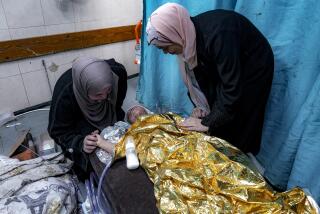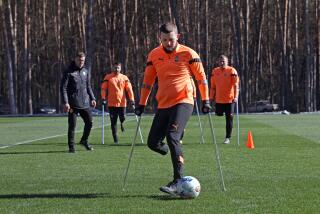Balkan War Rape Victims: Traumatized and Ignored
ZAGREB, Croatia â A dazed, 60-year-old woman spends most of her day staring at the wind-swept leaves around her refugee camp, waiting listlessly for the end of her life. Her wounds from gang rape by soldiers are more emotional than physical, but she has neither the strength nor the will to recover.
A 28-year-old in the fetid basement of Zagrebâs mosque is too worried about her children to apply the one salve she says would end the suffering inflicted by multiple rapes. Her three toddlers, already traumatized from having witnessed the beating and violation of their mother, would be orphaned as well as homeless if she were to succumb to the urge to take her own life.
For girls like a 17-year-old Muslim waiting to give birth after months of sexual enslavement, there is neither professional help nor much prospect of healing. Each time a fetal foot or elbow swims across the womb, those impregnated by war rape relive the terror of the attacks.
The young, unmarried ones have nothing to inspire hope for the future, psychologists and social workers say, because they will be ostracized in their tradition-bound societies once the war ends and some semblance of civil life returns to their homeland.
The victims of war rape are largely being ignored in Croatia, where predominantly male, Roman Catholic, conservative health officials are too discomfited by the subject to provide care or compassion.
As a gynecologist attending to the pregnant Muslim teen-ager put it, âFor her there are probably no alternatives but madness or prostitution.â
No one can estimate the number of women who have been raped during the 18 months of the Yugoslav war, a conflict that has visited medieval barbarity on hundreds of thousands of lives.
Most of the rape victims have been cast out of their homes and left to fend for themselves, and sometimes their small children as well, in battle zones without food, warm clothing or shelter. Many are too shattered by the degradation or too overwhelmed by the struggle to stay alive to confide to overburdened relief workers what they have endured.
For those who do talk, often with the hope of drawing attention to the common plight of women in vanquished areas of Croatia and Bosnia-Herzegovina, there is little reward aside from the emotional catharsis of voicing a painful truth.
Their experiences are horrifying and legion. At virtually every refugee camp and hostel in crowded Croatia, haunted women of all ages plod through the motions of living, propelled only by the need to be strong for children or parents depending on them.
âWho knows how many there are? 50,000? 60,000? Every time one woman finds the strength to talk about what has happened to her, it turns out every woman in her village was raped. This is happening in all the occupied areas,â said Zorica Spoljar, a volunteer with the Kareta feminist organization who has been visiting refugee shelters to talk to rape victims.
âMen rape during war because it is considered an act of the victors,â she said. âIn traditional societies, like those in the occupied areas, women have always been considered property, so violating them is a way for the winners to show who now controls that property.â
Medical workers treating the wounded and diseased flooding into Croatia say they have neither the time nor the expertise to provide the psychological counseling that the rape victims need--with the added complication that most of the women refuse to acknowledge their injuries.
âWe can often tell that a woman has been raped, by bruises or infections, but they will rarely admit it,â said Sarifa Gordanjak, a doctor from the Bosnian capital of Sarajevo attending to Muslim refugees in Zagreb, the Croatian capital.
Some victims relate their attacks in the third person, or delegate the disclosure to trusted elders. While their daughters wept in silence, two older women from Hanifici, near the central Bosnian city of Kotor Varos, told of a three-night ordeal suffered by the younger women of their village after Serbian rebels moved in with tanks and artillery, rounded up adult men and marched them off to a fate still unknown to the women.
âWe could hear their cries all day and all night,â a woman named Hefa said of the rape victims. âThe Chetniks (Serbs) kept their truck motors running, but it wasnât enough to drown out their screams.â
The 28-year-old sheltered at the mosque is too distracted by worries for her children to bother with keeping up a modest facade. The rapes, amid four months of unmitigated terror, seem to have equal rank with the other brutalities in her recollections. She has no more tears to shed in the retelling.
âThey kicked in the door. I donât know how many. They just started going through everything in the house and demanding to know where we kept our D-marks (German currency),â recounted the hollow-eyed mother, clutching her two youngest ones protectively. âI kept telling them we didnât have any, but they didnât believe me. They took turns beating and raping. My children didnât know what was happening, but they were afraid and screaming. One of (the soldiers) smashed my daughter in the head with his rifle butt. I didnât care what they were doing to me--I was just terrified for my children.â
Night after night, drunken soldiers came by in groups after her village near Prijedor was encircled in May and systematically emptied of all men over the age of 14. Women and children remained until Serbian rebels herded them away en masse in September, adding thousands more victims to their signature practice of âethnic cleansing.â
The ordeals of many of the rape victims range to the unspeakable. The 60-year-old woman from eastern Croatia, who says she has no plans except to die, exhibits little emotion in telling of countless acts of forced oral sex by sadistic soldiers.
Womenâs groups and anti-war organizations complain bitterly that nothing is done for the innumerable victims of sexual violence that has been a consequence of this war, like all others before it.
âNo one here cares about the women. There is no social consciousness on this issue,â said Biljana Kasic, a political scientist trying to marshal international attention to the problem of war rape.
âPeople here are only interested in these cases of rape insofar as they provide evidence of who our enemies are,â Kasic said. âWe need to bring this issue to the attention of womenâs groups abroad, because these womenâs needs are not going to be dealt with here.â
The fledgling Zagreb feminist movement has been appealing to like-thinking groups abroad to demand the closure of all detention camps for women in the war zones.
More than 7,000 women are being held prisoner and subjected to sexual abuse at a Serb-run camp near the northern Bosnian city of Brcko, gynecologist Nermana Boloban said she had been told by numerous refugees. The doctor, herself a refugee from Sarajevo, said medical workers are also told repeatedly of Muslim women being enslaved in the Sarajevo suburb of Grbavica.
Kasic said her organization, known as the Autonomous Womenâs House, is calling for revision of the Geneva Convention to designate rape as a war crime. The group also is seeking foreign help in establishing a counseling service for war rape victims.
There are virtually no services for rape victims in either Bosnia or Croatia. Aid agencies, charities and religious organizations are too overwhelmed by the task of feeding and housing more than 2 million displaced by the war to devote resources to those whose injuries are not life-threatening.
âThe first thing we have to worry about is a place to put them,â said Faruk Regepagic, director of the Muslim aid agency Merhamet. âThe main problem is really the war. We have to stop the war and stop the embargo on arms that prevents us from defending our homes, our women, our lives. The first task is to protect ourselves.â
A delegation from the U.S.-based Womenâs Commission for Refugee Women and Children recently visited Croatia and Bosnia. They cited the problem of gang rape as one of many war hazards about which the outside world has done too little.
Psychologist Katherine Moseley of New York said the womenâs delegation repeatedly encountered cases of rape victims who had not received even rudimentary medical treatment for venereal disease and physical injury suffered during the attacks--nor, she said, had there been any attempt to provide counseling for the psychological wounds.
âThere was very little semblance of any organization or structure,â Moseley said. âAll we could do was try to talk to the women, to get the word out so that other organizations can help them. Some of the women were eager to talk with us. Probably, unfortunately, they thought once they got their stories out, the world would be moved to help them. But as we see, it is not.â
The few foreign and domestic groups examining the consequences of war rape all emphasize that as long as the conflict continues, there will be growing numbers of refugees demanding relief workersâ attention, depriving the victims of sexual aggression of any chance to heal.
âMost of these women are totally ruined. They will probably never have normal sexual relations again in their lives--as we only recently realized was what happened with the âcomfort womenâ Japanese abused 50 years ago,â said Spoljar, the volunteer social worker. âEven after the wars are over, society just seems to leave these women for dead.â
More to Read
Sign up for Essential California
The most important California stories and recommendations in your inbox every morning.
You may occasionally receive promotional content from the Los Angeles Times.











